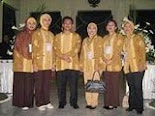Senin, 21 Desember 2009
I. INTRODUCTION
Experiences of loss are normal and essential in human life. Letting go, relinquishing, and moving on happen continually as a person travels through the stages of growth and development. People frequently say”goodbye”to places, people, dreams, and familiar objects. Loss allows a person to change, develop, and fulfill his ore her innate human potential. Loss may be planned, expected, or sudden. Although it can be difficult, loss sometimes is beneficial. Other times, it is devestating and debilitating. The meaning of loss is subjective, as is the process of responding to a loss. Unresolved losses in the past influence how we manage current losses. Factors such as guilt, financial issues, ambivalence, age, culture, number of current stressors, and available support system determine how we react to loss and express our grief (Gorman, Sultan, and Raines, 1996).
Loss is human experience and a challenge we all must face. Loss requires that we give up something familiar, comfortable, and personal. Loss of person includes death, separation, divorce, moving, and changes in mental or physical status. As we go through our life span we experience developmental losses associated with life transitions, such as grown children leaving the home or retirement from a career (Klebanoff and Smith, 1997). Loss is an actual or potential situation in which something that is valued is changed, no longer available, or gone (Barbara Kozier,2004). People can experience the loss of body, a significant other, a sense of well-being, a job, personal possession, belief, or a sense of self. Illness and hospitalization often produces losses. Death is fundamental loss, both for the dying person an d for those who survive. Although death is inevitable, it can stimulate people to grow in their understanding of themselves and others. Death can be viewed as the dying person’s final opportunity to experience life in ways that bring significance and fulfillment. People experiencing loss often search for the meaning of the event and it is generally accepted that finding meaning is needed in order for healing to occur. Note, however, that persons can be well adjusted without searching for meaning and that even those who find meaning do not see it an end point, but rather an ongoing process (Davis, Wortman, Lehman, & Silver, 2000).
II. TYPES AND SOURCES OF LOSS
There are two general types of loss, actual and perceived. Both losses can be anticipatory. An actual loss can be recognized by others. A perceived loss is experienced by one person but cannot be verified by others. Psychologic losses are often perceived losses in that they are not directly verifiable. For example, a woman who leaves her employment to care for her children at home may perceive a loss independence and freedom. An anticipatory loss is experienced before the loss actually occurs. For example, a woman whose husband is dying may experience actual loss in anticipation of his death.
A helpful way to examine different types of losses is to use Abraham Maslow (1954), a hierarchy of needs motivates human actions. These needs begin with physiologic needs (foods, air, water, sleep), then safety needs (a safe place to live and work), then security and belonging needs (satisfying relationships). After those needs comes the need for self-esteem, which leads to feelings of adequacy and confidence. The last and final need is self-actualization, the ability the realizeone’s full innate potential. When these human needs are taken away or not met for some reason, the person experiances loss. Examples of losses related spesicific human needs in Maslow’s hierarchy are as follows:
¨ Physiologic loss. Examples include amputation and loss of adequate air exchange or pancreatic functioning.
¨ Safety loss. Loss of a save environment such as following domestic or public violence. A person may perceive a breach of confidentiality in the professional relationship as a loss of psychogical safety secondary to broken trust between client and provider.
¨ Loss of security and a sense og belonging. The loss of a loved one affects the need to love and be loved. Loss accompanies changes in relationships such as birth, marriage, divorce, illnes, and death: as the meaning of a relationships changes, a person may lose roles within a family or group.
¨ Loss of self – esteem. Any change in how a person is valued at work or in relationships can threaten his or her need for self – esteem. A change in self – perception can challenge sense of self – worth, which the person may experience as a loss. A loss of role function and the self – perception and worth tied to that role may accompany the death of a loved one.
¨ Loss related to self – actualization. An external or internal crisis that blocks or inhibits strivings toward fulfillment may threaten personal goals and individual potential (Parkes, 1998). A change in goals or direction will precipitate an inevitable period of grief as the person gives up a creative thought to make room for new ideas and directions. Examples include having to give up plants to attend graduate school or losing the hope of marriage and family.
III. STAGES OF GRIEVING AND BEHAVIORAL RESPONSES
Elisabeth Kubler-Ross’s (1969) established basis for understanding how loss affects human life. As she attended to clients with terminal illnesses, a process of dying became apparent to her. Through observations of and work with dying clients and their families, Kubler-Ross developed a modal of five stages to explain what people experience as they grieve and mourn:
1. Denial — shock and disbelief regarding the loss.
« Person refuses to believe that loss is happening.
« With death or trauma, may actually block the memory of the incident or momentarily believe it has not occurred.
« Is unprepared to deal with practical problems, such as prosthesis after loss of leg.
« May assume artificial cheerfulness to prolong denial.
Denial is usually only a temporary defense for the individual. This feeling is generally replaced with heightened awareness of situations and individuals that will be left behind after death.
Example – “I feel fine.”; “This can’t be happening, not to me.”
2. Anger — may be expressed toward God, relatives, friends, or health care providers.
« Client or family may direct anger at nurse or hospital staff abou matters that normally would not bother them.
« There may be an acute sense of unfairness, fear, anger, and even rage.
Once in the second stage, the individual recognizes that denial cannot continue. Because of anger, the person is very difficult to care for due to misplaced feelings of rage and envy. Any individual that symbolizes life or energy is subject to projected resentment and jealousy.
Example – “Why me? It’s not fair!”; “How can this happen to me?”; “Who is to blame?”
3. Bargaining — occurs when the person asks God or fate for more time to delay the inevitable loss.
« Person seeks ro bargain to avoid loss.
« The bargain may bestruck with Go, with decreased, or one self.
« May express feelings of guilt or fear of punishment for past sins, real or imagined.
The third stage involves the hope that the individual can somehow postpone or delay death. Usually, the negotiation for an extended life is made with a higher power in exchange for a reformed lifestyle. Psychologically, the person is saying, “I understand I will die, but if I could just have more time…”
Example – “Just let me live to see my children graduate.”; “I’ll do anything for a few more years.”; “I will give my life savings if…”
4. Depression — results when awareness of the loss becomes acute.
« Person grieves over what cannot be.
« May talk freely (e.g., reviewing past lossess such as money or job)or may withdraw.
« Acknowledge feelings, allows nurturing by self or others, amd moves forward in the process.
During the fourth stage, the dying person begins to understand the certainty of death. Because of this, the individual may become silent, refuse visitors and spend much of the time crying and grieving. This process allows the dying person to disconnect themself from things of love and affection. It is not recommended to attempt to cheer an individual up that is in this stage. It is an important time for grieving that must be processed.
Example – “I’m so sad, why bother with anything?”; “I’m going to die . . . What’s the point?”; “I miss my loved one, why go on?”
5. Acceptance — occurs when the person shows evidence of coming to terms with death.
« Person comes to term with loss.
« Depression has been lifted; loss is acknowledged.
« May have reduce interest in surroundings and support persons as loss is no longer focal point.
« May wish to begin making plans (e.g., living will, prosthesis, altered living arrangements)
« Is now free to move forward.
This final stage comes with peace and understanding of the death that is approaching. Generally, the person in the fifth stage will want to be left alone. Additionally, feelings and physical pain may be non-existent. This stage has also been described as the end of the dying struggle.
Example – “It’s going to be okay.”; “I can’t fight it, I may as well prepare for it.”
IV. FACTORS INFLUENCING THE LOSS AND GRIEF RESPONSES
1. Age
Age effects a persons understanding of and reaction to loss. With familiarity, people usually increase their understanding and acceptance of life, loss, and death.
People do not usually experiences is difficult. Coping with other of life’s losses, such as the loss of a pet, the loss of friend, and the loss of youth or a job, can help people anticipate the more severe loss of death of loved ones by teaching them successful coping strategies.
o Childhood
Children differ from adults not only in their understanding of loss and death but also in how they are affected by the loss of others. The loss of a parent or other significant person can threaten the child’s ability to develop, and regression sometimes results.
Some adults may assume that children do not have the same need as an adult to grieve the loss of others. In situations of crisis and loss, children are sometimes pushed aside or protected from the pain. The can feel afraid, abandoned, and lonely. Careful work with bereaved children is especially necessary because experiencing a loss in childhood can have serious effects later in life.
o Early and Middle Adulthood
The loss of a parent through death seems a more normal occurrence compared to the death of a younger person. The middle-aged adult can experiences losses other than death. For example, losses resulting from impaired health or body function and losses of various role functions can be difficult for the middle-aged adult.
How the middle-aged adult responds to such losses of various role functions can be difficultfor middle-aged adult.
o Late Adulthood
Losses experienced by older adults include loss of helath, mobility, independence, and work role. Limited income and the need to change one’s living accommodations can also lead to feelings of loss and grieving.
2. Significance of the Loss
The significance of a loss depends on the perceptions of the individual experiencing the loss. One person may experience a great sense of loss over a divorce; another may find it only mildly disrupting. A number of factors affect the significance of the loss:
- Importance of the lost person, object, or function
- Degree of change required because of the loss
- The person’s beliefs and values
For older people who have already encountered many losses, an anticipated loss such as their own death may not be viewed as highly negative, and they may be apathetic about it instead of reactive. More than fearing death, some may fear loss of control or becoming a burden.
3. Culture
Culture influences an individual’s reaction to loss. How grief is expressed is often determined by the custom of the culture. Some cultural group value social support and the expression of loss. In some groups, the expression of grief through wailing, crying, physical prostration, and other outward demonstration are acceptable and encourages. Other groups may frown on this demonstration as a loss of control, favoring a more quite and stoic expression of grief.
4. Spiritual Beliefs
Spiritual beliefs and practices greatly influence both a person’s reaction to loss and subsequent behavior. Most religious groups have practices related to dying, and these are often important to the client and support people. To provide support at a time of death, nurses need to understand the client’s particular beliefs and practices.
5. Gender
Men are frequently expected to be “strong” and show very little emotion during grief, whereas it is acceptable for women to show grief by crying. Often a wife dies, the husband, who is the chief mourner, is expected to repress his own emotions and to comfort sons and daughters in their grieving. Gender roles also affect the significance of body image changes
to clients. A man might consider his facial .
6. Socioeconomic Status
The socioeconomic status of an individual often affects the support system available at the time of a loss. A pension plan or insurance, for example, can offer a widowed or disabled person a choice of ways to deal with a loss; a person who is confronted with both severe loss and economic hardship may not be able to cope with either.
7. Support System
The people closest to the grieving individual are often the first to recognize and provide needed emotional, physical, and functional assistance. However, because many people are uncomfortable or inexperienced in dealing with losses, the usual support people may instead withdraw from the grieving individual. Support may be available when the loss is first recognized, but as the support people return to their usual activities, the need for ongoing support may be unmet. Sometimes, the grieving individuals is unable or unready to accept support when its offered.
8. Causes of loss or Death
Individual and societal views on the cause of a loss or death may significantly influence the grief response. A loss or death that is beyond the control of those involved may be more acceptable that one that is preventable, such as a drunk driving accident. Injuries or death occurring during respected activities, such as “in the line of duty,”are considered honorable, whereas those occurring during illicit activities may be considered the individuals just reward.
0 Comments:
Subscribe to:
Posting Komentar (Atom)
















